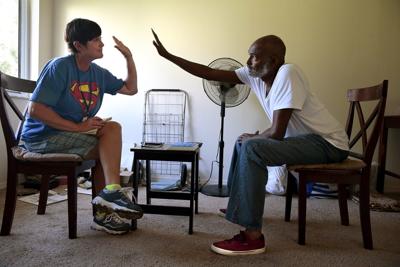ST. LOUIS — A federally funded ӣ����Ƶ nonprofit is facing blowback from employees for restricting diversity, equity and inclusion activities in what the CEO called a response to President Donald Trump’s executive orders.
Tony Hilkin, chief executive of Places for People, a local nonprofit mental health provider, sent an email to staff this spring saying the organization would no longer participate in Pride celebrations, use pronouns in email signatures, or place “DEI flags, signs and decorations” in public-facing parts of the workplace.
He said the changes were in response to Trump’s executive orders and “to reduce risks to our funding.”
Now employees are demanding managers reverse course. A petition signed by 70 workers asks managers to commit to DEI practices and reinstate participation in Pride Fest, according to a news release.
People are also reading…
Sarah McClure, a community support specialist at Places for People, called the events “upsetting as a queer individual” but “even more enraging as a social worker.”
“It’s our duty to be the last line of defense and resistance,” McClure said in a news release. “The greater community is losing when we stop showing up, stop pushing back, stop advocating and giving voice to those most marginalized and vulnerable populations.”
A spokesperson for Springfield, Missouri-based Brightli Inc., which partnered with Places for People last year, said Brightli subsidiaries are committed to maintaining a welcoming workplace that values respect, compassion, empathy and understanding.
But many Brightli subsidiaries have to follow federal health care program requirements, Rance Burger, spokesperson for Brightli, said in a statement.
“Brightli engaged in a variety of strategies to better align its culture with the climate of 2025,” he said in the statement.
The changes at Places for People are another example of how companies and nonprofits are shifting during the new Trump administration. Large corporations such as Anheuser-Busch have pulled support from LGBTQ Pride events this year. Juneteenth events across the country, which celebrate the end of slavery in the U.S., have also been scaled back this year, the Associated Press .
Places for People was formed in 1972 and helps people struggling with mental illness and substance abuse. It is located at 1001 Lynch Street in Soulard.

Places for People care team leader Pam Leeper high-fives Bart Washington during a home visit to his apartment in north ӣ����Ƶ County on Wednesday, Sept. 18, 2019. Places for People announced plans on Friday, Feb. 23, 2024, to partner with Springfield, Missouri-based Brightli — one of the country’s largest nonprofits providing behavioral and addiction recovery care — to expand services in the ӣ����Ƶ region.
Brightli, the nation’s fourth-largest nonprofit behavioral health organization by total revenue, reports serving more than 100,000 people with a revenue of around $500 million. Places for People lists annual revenue of $22.6 million for fiscal year 2022.
Hilkin, the CEO, wrote his first note to staff on April 8.
He sent it to update employees on the effects of recent executive orders, he said in the email.
“First, I want to acknowledge that this is a challenging time, and that these are not easy decisions to read about, make or implement,” he wrote.
He said one specific “culture and engagement” program would continue. And Places for People would still observe Juneteenth as a paid holiday this year.
But, in a June 5 follow-up email, he then said that the Juneteenth policy would change next year: Places for People would follow Brightli’s standard holiday schedule that includes a floating holiday in place of Juneteenth.
Employees, in a letter sent to management, said Hilkin’s April 8 email indicated Places for People was “preemptively acquiescing” to Trump’s executive orders.
Jane Posen, a community support specialist for Places for People, said the nonprofit originally recognized Juneteenth as a holiday “before it was even acknowledged as a federal one” in 2021.
“For Brightli to dismiss and revoke workers’ abilities to honor and celebrate Black history is not only an erasure of hard won progress, but a tell of where they stand as an organization,” Posen said in the news release.
Missouri legislators in 2003, calling it “Emancipation Day.”
Storms, baby bison and Simone Biles: Here's a look at May 2025 in the ӣ����Ƶ area. Video by Jenna Jones.









